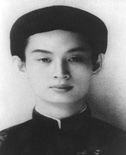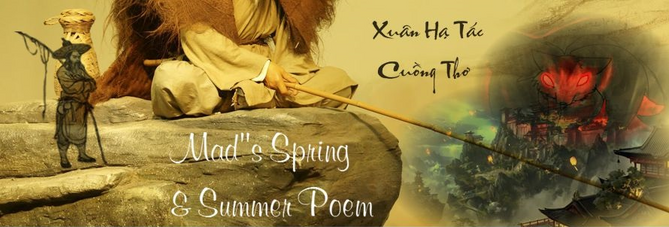PHẬT GIÁO HÒA HẢO
HARMONY BUDDHISM
Jiang Zi Ya Khương Tử Nha
XUÂN-HẠ TÁC CUỒNG-THƠ
Sĩ điềm tịnh tiểu-nhơn lấn-lướt,
Thời-vận hèn dụng nhược thắng cang.
Cầu cho bốn biển bằng an,
Chúc câu lai thới xóm làng vĩnh-miên.
Xưng danh hiệu nửa Tiên nửa tục,
Đứng trung-thần gạn đục tầm trong.
Gìn câu thủ cựu gia phong,
Gom nhành lá rụng vun trồng giống xưa.
Tơ lòng nhiều đoạn đẩy-đưa,
Mong ơn Phật-Thánh phước thừa cho dân.
Chúng lấy thuyết vô thần bài bác,
Quyết một ngày thông đạt địa thiên.
Chúng-sanh nghe thửa lời truyền,
Cùng nhau thảo thuận danh hiền mới thơm.
Dốc chờ ngày sen đơm nhụy trổ,
Khỏi bùn lầy tông-tổ hiển vang.
Bá-Nha hiệp mặt tao-đàn,
Tử-Kỳ trổi giọng khải hoàn bốn phương.
Lòng chạnh cảm quê-hương nghèo-ngặt,
Các nước ngoài bán mắc hàng lên.
Ơn cha nghĩa mẹ phải đền,
Một ngày hiệp mặt lập nền từ-bi.
Những mơ-ước hồi qui thượng-cổ,
Thì hết câu ái-ố gièm-pha.
Phương Nam rạng ngọc chói lòa,
Lưu-ly hổ-phách mấy tòa đài cung.
Dành cho kẻ lòng trung chánh-trực,
Quân cùng Thần náo-nức vui-tươi.
Liên-hoa đua nở nụ cười,
Rước tôi lương-đống chào người chơn tu.
Thế-gian thoát chốn ngục-tù,
Thần Tiên hiệp mặt thì cù hóa long.
Mắt nhìn thấy thần thông biến hóa,
Đức Di-Đà hiện chóa hào quang.
Việt-Nam là giống Hồng-Bàng,
Không còn hung-bạo lăng-loàn như nay.
Dòm khắp chốn rồng mây chơi giỡn,
Dân hai lòng hết bỡn Khùng-Điên.
Thiên cơ biến ảo diệu huyền,
Hiệp chung tam cõi dưới miền trần ai.
Bút nghiên hạ viết bài an lạc,
Dẫu cho người dốt nát cũng nghe.
Kìa kìa con cuốc gọi hè,
Chẳng lo gieo giống đậu, mè, bắp, khoai.
Thi tả cảnh Bồng-Lai tại thế,
Mãi chần-chờ e trễ kỳ thi.
Muôn năm Trời định khắc kỳ,
Ngặt ông thất thủ Hạ-bì khó toan.
Ta điên thuở Tam-Hoàng Thượng-cổ,
Khùng thế thời khùng lộ ngoài da.
Ghét dòng con nịnh độc xà,
Khinh-khi trung nghĩa hải hà lòng nhơn.
Đường gai gốc thiên sơn vạn hải,
Dẹp cho rồi tướng bái đàn đăng.
Tử-Nha như thể cát-đằng,
Tùng quân dựa bóng vui bằng hưng Châu.
Các nơi Tiên-trưởng đâu đâu,
Lư-bồng hội hiệp đồng chầu Thánh-vương.
Trụ kia bạo-ác phải nhường,
Võ-vương hữu đức đường đường trị dân.
Thì rõ việc Phong-Thần trở lại,
Thuyền Đông-Pha lèo lái cánh trương.
Con lành mau lại Phật đường,
Cùng Thầy cọng hưởng một vườn từ-bi.
Chớ nóng-nảy sân-si hư việc,
Phải đợi thời vua Kiệt hồi qui.
Xử phân những đứa vô nghì,
Mới là khỏa lấp vít tỳ ngọc son.
Khuyên rán giữ cho tròn đời đạo,
Đừng cho loài cầy cáo lung-lăng.
Yêu tinh chực nuốt Đường-tăng,
May nhờ Đại-Thánh phi đằng cứu nguy.
Lôi-Âm tự đường đi chưa đến,
Nên giữa chừng kẻ mến người khinh.
Thôi thôi ta để mặc tình,
Dầu ai chê nhạo phận mình mình toan.
Hòa-Hảo, tháng tư năm Canh-Thìn
MAD’S SPRING AND SUMMER POEM
Calm scholars are often bullied by villains,
In poor times, I use softness to beat the arrogant.
I pray for peace to reign over four seas,
I wish eternal prosperity to all villages.
Adopting the style of half holy and half worldly,
The loyal nobleman strains mud for purity.
He upholds the old traditions of the country,
Amassing fallen leaves to fertilize their old race.
As if my guts were segmentally diluted,
With Buddha’s grace, I wish people imbued.
They use atheism to run a big slur,
Saying they will realize a paradise on Earth.
The mass heard and practiced my message,
Debate together to scent your names as sages.
For the lotus to blossom, firmly wait, oh flowers!
No longer bogged down, here glow ancestors.
Bo-Ya (1) happily concerted with his bosom friend,
Zi-Qi, who sang for global triumph to descend.
I’m touched by the country’s tribulations,
As imports are surcharged by foreign nations.
The filial debts of gratitude must be repaid,
You will meet up with your Compassion a day.
We dream of restoring the Antiquity,
That is, the end of love, hate, and travesty.
The South radiates with glittering jades,
There are plenty of ceramic and amber palaces.
These are reserved for the gracious loyals,
The King will heighten his joy with his Nobles.
The Lotus blooms compete with smiles,
They welcome true practicers and knights.
The world will be freed from its own prison,
When Fairies meet up, crocs become dragons.
Look at supernatural miracles on show,
Lord Amida appears with a dazzling halo.
The Vietnamese are the Hong Bang race,
They’ll not be as cruel and roguish as today.
Everywhere Dragons and Clouds serenade,
The cynical will no longer tease the Mad.
Prophesied is a tremendous magical surge,
The three realms converge on earth.
With brush and ink, I write on beatitude,
Even the illiterate should be able to salute.
Voilà! The Cuckoos are calling for summer,
Why not sow seeds of beans, sesame, maize, tater.
My poem describes the on-earth Paradise,
Don’t procrastinate or you’ll miss the trial.
Once in a ten thousand years is Predestiny,
If late, you’ll lose the rare opportunity.
I turned fool since the Ancient Three Emperors,
I‘m a brazen mad to work on the timer.
I hate the horde of viper sycophant,
Belittling the loyal, righteous, indulgent.
The path is riddled with mountains and seas,
I must dispose of all showy businesses.
Zi-Ya (2), like creeper bracing for its right conifer,
Once he met the Zhou King (3), they all prospered.
Wherever all Fairy Elders have been,
They reunite for an audience with the Sacred King.
The cruel Zhou King of Shang(4) must abdicate,
For the virtuous Wu King to take the mandate.
The Judgement Day to return is clearly known,
The Dong Pha (5) boat tackles its sails, full-blown.
The good should take refuge in Buddhism,
With their Master, share in a blissful realm.
Don’t spoil your scheme by being angry,
Wait for the Jie King (6) to make a back journey.
Only if the unrighteous have faced justice,
All the jades will heal their crevices.
I urge you to fulfill your human duties,
Don’t let yourself be controlled by rascal foxes.
The Demon almost swallows the Tang Monk (7),
Luckily the Great Monkey fast flies upon.
The Lei Yin Pagoda (8) is still far away,
So mid-course, some praise, others degrade.
Enough is enough! I let them do whatever,
I take care of myself whosoever slanders.
Hoa Hao, the April of 1940
ENDNOTES
(1) Vietnamese: Bá Nha; Chinese: 伯牙, Pinyin: Bo-Ya These are the names of the talented people in the Spring and Autumn period.
One day when Bo-Ya played his stringed instrument close to Chung Tu Ki(鍾子期), Tu Ki heard the sound and straight away knew what Bo-Ya thought. People called two people bosom friends.
(2) Jiang Ziya (fl. 11th century bc), also known by several other names, was a Chinese noble who helped kings Wen and Wu of Zhou overthrow the Shang in ancient China. Following their victory at Muye, he continued to serve as a Zhou minister. He remained loyal to the regent Duke of Zhou during the Rebellion of the Three Guards; following the Duke's punitive raids against the restive Eastern Barbarians or Dongyi, Jiang was enfeoffed with their territory as the marchland of Qi. He established his seat at Yingqiu (in modern Linzi). Open Wikipedia: Jiang Zi Ya (姜子牙)
(3) Zhou King (Vietnamese: Châu Vương), different to the Zhou King of Shang (Vietnamese: Trụ Vương Nhà Thương), though they share the same surname in Chinese pinyin. They are opposite personalities, the former being well-known for his righteousness and compassion whereas the latter was notorious with a legend of his atrocities committed against his righteous noblemen and people because of his passion with the legendary Daji (Chinese: 妲己; pinyin: Dájǐ; Wade–Giles: Ta2-chi3), the favorite consort, as a malevolent fox spirit.
The Zhou dynasty (Chinese: 周; pinyin: Zhōu [ʈʂóu]) was a Chinese dynasty that followed the Shang dynasty and preceded the Qin dynasty. The Zhou dynasty lasted longer than any other dynasty in Chinese history (790 years). The military control of China by the royal house, surnamed Ji, lasted initially from 1046 until 771 BC for a period known as the Western Zhou and the political sphere of influence it created continued well into Eastern Zhou for another 500 years.
During the Zhou Dynasty, centralized power decreased throughout the Spring and Autumn period until the Warring States period in the last two centuries of the Zhou Dynasty. In this period, the Zhou court had little control over its constituent states that were at war with each other until the Qin state consolidated power and formed the Qin dynasty in 221 BC. The Zhou Dynasty had formally collapsed only 35 years earlier, although the dynasty had only nominal power at that point. This period of Chinese history produced what many consider the zenith of Chinese bronze-ware making.
(4) The Zhou dynasty also spans the period in which the written script evolved into its almost-modern form with the use of an archaic clerical script that emerged during the late Warring States period. Open Wikipedia: Zhou dynasty King Zhou (/dʒoʊ/; Chinese: 紂王; pinyin: Zhòu Wáng) was the pejorative posthumous name given to Di Xin (Chinese: 帝辛; pinyin: Dì Xīn), the last king of the Shang dynasty of ancient China.
He is also called Zhou Xin (紂辛; Zhòu Xīn). He may also be referred to by adding "Shang" (商 Shāng) in front of any of his names. In Chinese, his name Zhòu (紂) also refers to a horse crupper, the part of a saddle or harness that is most likely to be soiled by the horse. It is not to be confused with the name of the succeeding dynasty which has a different character and pronunciation.
Open Wikipedia: Zhou of Shang
(5) Su Dongpo (Vietnamese: Tô Đông Pha) Chinese writer, poet, painter, calligrapher, pharmacologist, gastronome, and a statesman of the Song dynasty. A major personality of the Song era, Su was an important figure in Song Dynasty politics, aligning himself with Sima Guang and others, against the New Policy party led by Wang Anshi. Open Wikipedia To Dong Pha Jie King, King Jie (Chinese: 桀; traditionally 1728 – 1675 BCE) was the 17th and last ruler of the Xia dynasty of China. He is traditionally regarded as a tyrant and oppressor who brought about the collapse of a dynasty.[1] Around 1600 BCE, Jie was defeated by Tang of Shang, bringing an end to the Xia Dynasty that lasted about 500 years, and a rise to the new Shang Dynasty.
Open Wikipedia
(6) “Jie” King here may also mean the excellent(傑出)King whose love for his people is proven with his commitment to their happiness.
(7) Tang Monk designates one of the main characters in the “Journey toward the West” romance in which the Buddhist monk was assigned by the Tang dynasty, in China, to make an odyssey to the Buddhist temple in India for collecting Buddhist sutras in favor of the emperor. During the trip, he was deceived by the Demon, the King of Evil Spirits, who faked a Buddha to eat his meat deemed as the best of longevity drugs. But one of his companions, the Monkey King, knew the Demon’s scheme and flew back to the Monk’s rescue.
(8) Lôi Âm Tự, a pagoda bearing this name (Chi雷 音寺): located at Mt Vulture, in India, where Sakyamuni Buddha often came preaching during his lifetime. The term refers to the destination of the Buddhist practicers who strive to get enlightened as their ultimate goal.


